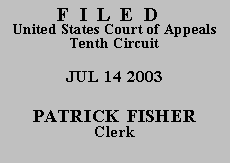

|
WENDEL ROBERT WARDELL, |
|
Before SEYMOUR, MURPHY, and O'BRIEN, Circuit Judges.
Proceeding pro se, Wendel R. Wardell, Jr. appeals the district court's dismissal of the civil rights complaint he brought pursuant to 42 U.S.C. § 1983. Wardell also seeks permission from this court to proceed in forma pauperis on appeal.
In his complaint, Wardell alleged that defendants have denied him his constitutional right to access the courts. The district court concluded that Wardell's complaint was frivolous and dismissed it sua sponte pursuant to 28 U.S.C. § 1915(e)(2)(B)(i). We review the dismissal of a complaint pursuant to 28 U.S.C. § 1915(e)(2)(B)(i) for an abuse of discretion.(1) See Schlicher v. Thomas, 111 F.3d 777, 779 (10th Cir. 1997). Like the district court, we note that Wardell has not alleged any fact "demonstrat[ing] that the alleged shortcomings in the library or legal assistance program hindered his efforts to pursue a legal claim." Lewis v. Casey, 518 U.S. 343, 351, 354-55 (1996) (holding further that the legal claim affected must be one that either directly or collaterally attacks plaintiff's conviction or sentence, or one that challenges the conditions of his confinement). We reject Wardell's argument that he is under no obligation to allege sufficient facts in his complaint to support his claim. We further note that Wardell does not contend on appeal that the district court should have provided him with an opportunity to amend his complaint and Wardell did not file a motion to alter or amend the judgment under Rule 59(e) or for relief from the judgment under Rule 60(b) after his complaint was dismissed. See Curley v. Perry, 246 F.3d 1278, 1284 (10th Cir. 2001) (discussing post-judgment procedural safeguards available to litigants whose complaints have been dismissed sua sponte pursuant to § 1915(e)(2)).
In light of the district court's clear and concise order and the absence of any reasoned argument in Wardell's appellate brief, this court concludes that Wardell's appeal is frivolous. Because Wardell's appeal is frivolous, his motion to proceed in forma pauperis is denied and his appeal is dismissed under 28 U.S.C. § 1915(e)(2)(B)(i).
The district court's dismissal of Wardell's complaint counts as a strike for purposes of 28 U.S.C. § 1915(g). Our dismissal of Wardell's appeal also counts as a strike for purposes of 28 U.S.C. § 1915(g). Thus, Wardell has now accumulated two strikes under 28 U.S.C. § 1915(g). See Jennings v. Natrona County Det. Ctr. Med. Facility, 175 F.3d 775, 780 (10th Cir. 1999). Wardell is hereby warned that if he accrues one more strike, he will be precluded from proceeding in forma pauperis in any further civil proceedings unless he is under "imminent danger of serious physical injury." 28 U.S.C. § 1915(g). Wardell is further notified that despite this court's dismissal of his appeal, he remains obligated to continue making partial payments until his appellate filing fee is paid in full. See id. § 1915(b).
ENTERED FOR THE COURT
Michael R. Murphy
Circuit Judge
*. This order and judgment is not binding precedent, except under the doctrines of law of the case, res judicata and collateral estoppel. The court generally disfavors the citation of orders and judgments; nevertheless, an order and judgment may be cited under the terms and conditions of 10th Cir. R. 36.3.
1.This court has indicated in an unpublished disposition that changes
in the PLRA may now dictate that determinations of frivolousness under
§ 1915(e)(2)(B)(i) are subject to a de novo standard of review. Basham v. Uphoff, No. 98-8013, 1998 WL 847689, at *4 n.2 (10th Cir. Dec. 8, 1998) (unpublished disposition). It is unnecessary to resolve this question here because there is no reversible error under either standard.